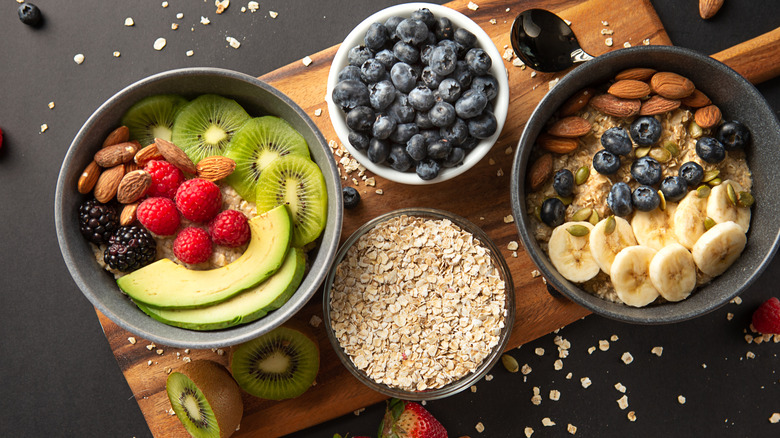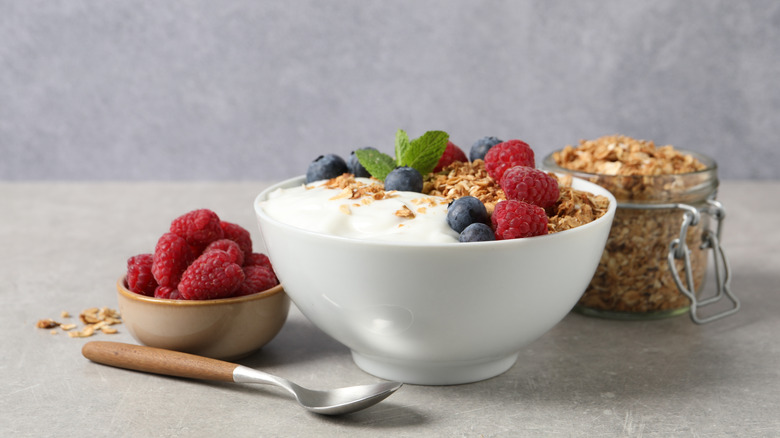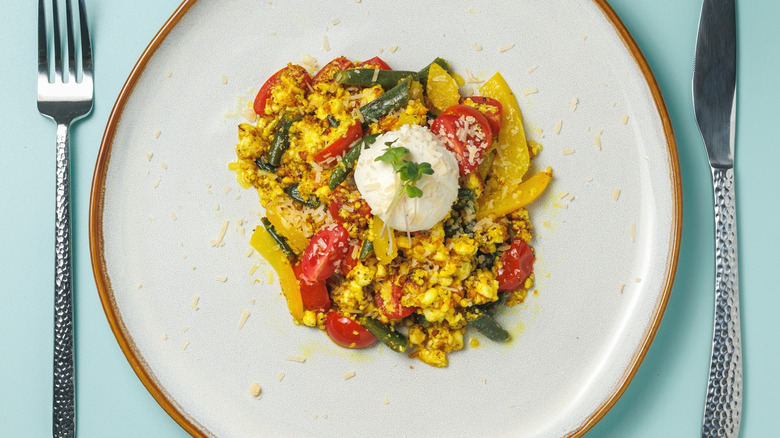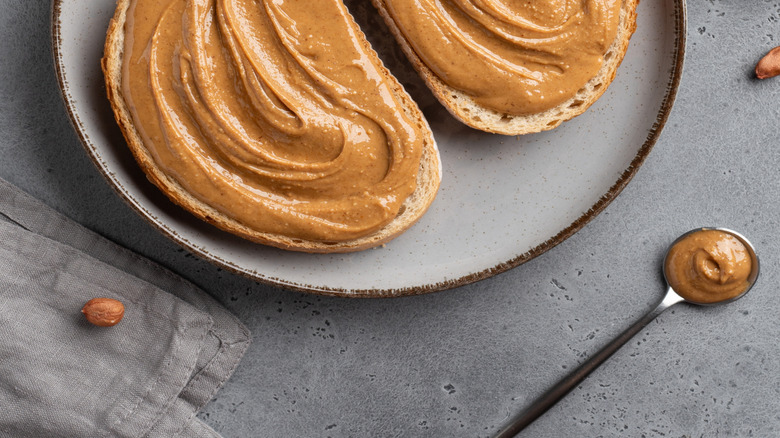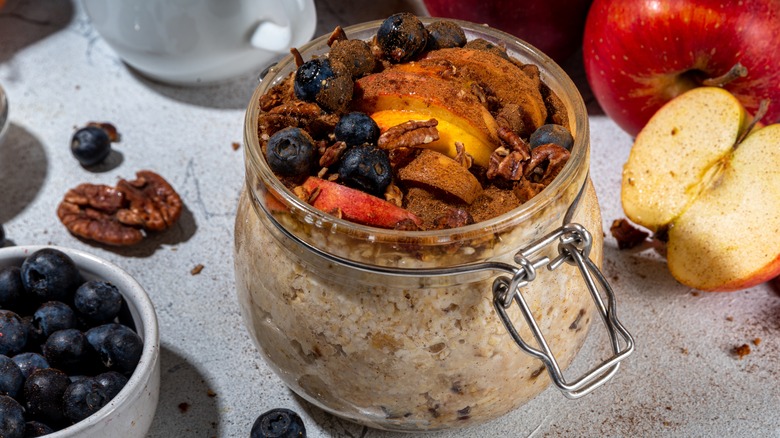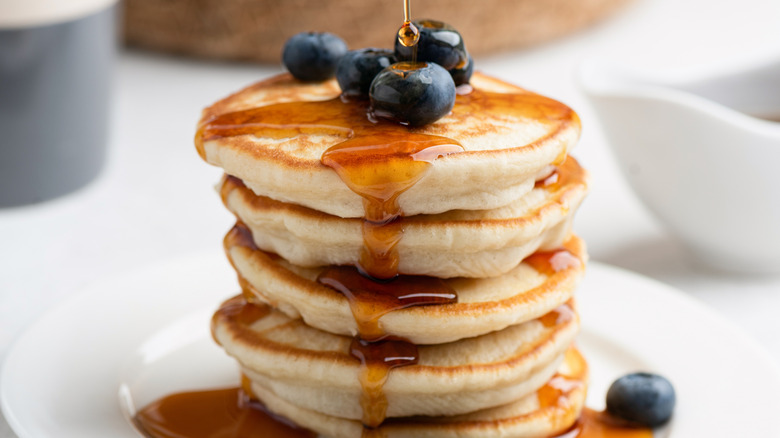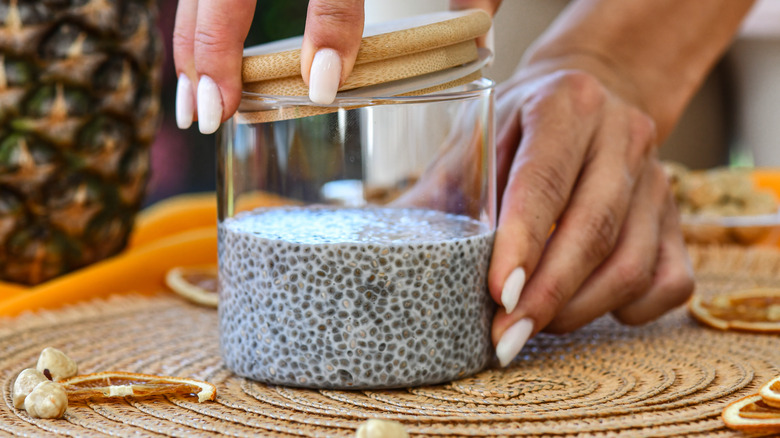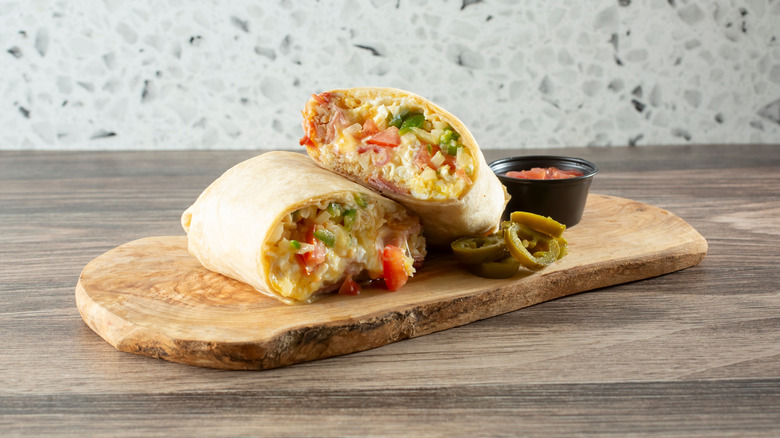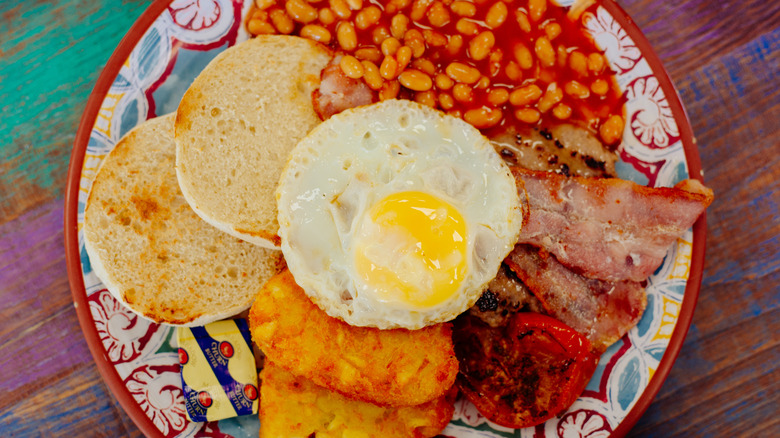9 High-Protein Breakfast Foods That Aren't Just Eggs
Ever get the egg ick? One minute you're practicing the perfect crack for unbroken yolks and looking forward to the same protein-packed breakfast you eat every day. The next, your eggs are just ... too eggy. Whether this sudden disgust is caused by food trauma, mild allergies, or just a lack of variety in your diet, it can seem like a real problem if you're trying to get your macros in at breakfast. But eggs aren't your only option for maximizing protein in the morning. From yogurt to smoothies to cheeky breakfast burritos, you can eat like a king in the morning without constantly cycling through scrambled, poached, and sunny-side-up.
We've collected nine breakfast ideas that all offer around the same amount of protein as three large eggs — about 20 grams. There are sweet and savory options, superfood ingredients, and health benefits beyond the bulk. We even threw a few vegan recipe ideas into the mix, along with dishes that use eggs and dairy as an ingredient rather than the main event. And if you're planning a weekend blow-out that still hits your protein goals or need to grab something on the run, we've got that covered too. None of these recipes rely on protein powder to boost their numbers, either, although several could be given an additional protein kick with a scoop of your favorite flavor or a smoothie on the side.
A Greek yogurt parfait
If you know anything about protein, you probably know about Greek yogurt. A single 7-ounce serving has 18 grams of protein and, if it's full fat, 190 calories. Low-fat and no-fat options are also available, which can halve the calorie load, but according to The Journal of Nutrition, fat and protein work together to make you feel fuller for longer. This means full-fat Greek or strained yogurt might be the better choice for breakfast, particularly if you want your morning meal to keep you going until lunch.
The toppings you choose for your yogurt are what make it a meal. Add rolled oats and seeds (or elevated homemade granola that contains both) for 5-10 additional grams of protein, chuck in some seasonal fruit for fiber and taste, and sweeten it with honey or maple syrup. You can even mix in some protein powder to add flavor to the yogurt while also maximizing your meal's macros. As long as you have Greek yogurt in the fridge, you can top up a bowl for a simple store-cupboard breakfast.
Tofu scramble, your way
Tofu can be a little intimidating for meat eaters, but it's a protein powerhouse that's delicious if you know how to cook it. Use firm or extra-firm products for around 20 grams of protein per serving, and press your block for an hour or so before cooking for a more meaty texture. Making a scramble couldn't be easier — just break the tofu up into a frying pan and add spices, salt and pepper, and vegetables. Garlic, nutritional yeast, turmeric, and thyme make the perfect mix to start with, but experimentation is encouraged.
Here at Daily Meal we like a Mexican tofu scramble. You can also add spinach, sweet potato, corn, edamame, or other protein-heavy vegetables to bump the protein in this meal up to 25 or even 30 grams. If you eat dairy, you could also grate in your favorite hard cheese or top your scramble with some plain Greek yogurt.
Peanut butter and jelly, with a difference
The plain PB&J sandwiches you have as an afternoon snack probably contain about 15 grams of protein. So if you're in a hurry or are having a particularly slow start to the day, two of them make a high-protein breakfast. If you want something more exciting or need a sandwich that scratches the peanut butter and jelly itch while delivering a bit more protein and fiber, you can make a few easy tweaks to the classic.
Swap peanut butter with almond butter for a couple additional grams of protein, or choose a high-protein peanut butter. You can also swap jelly for fruit, which will add a gram of protein if you use a ½ cup of blackberries or raspberries. Finally, use multigrain bread for around 5 grams of protein per slice. As an example, 2 slices of multigrain bread with 2 tablespoons of almond butter and a ½ cup of berries would make a PB&J with 21 grams of protein, and that's without using any specifically high-protein ingredients.
Oats, overnight or otherwise
Whether you soak oats overnight or cook them up in the morning, they offer a balanced, slow-release meal. Packed with fibre, antioxidants, protein, and carbs, there's a reason they've been a breakfast staple for hundreds of years. Whether you choose rolled, steel-cut, or quick oats, you'll get 5 grams of protein in a 40-gram serving.
This might not sound like much on its own. But with the addition of mix-ins like nut butters, Greek yogurt, your milk of choice, or even a scoop of vanilla or chocolate protein powder, overnight oats or porridge can easily hit 25 grams of protein and keep you full for hours. For a little excitement (as well as even more protein and fiber), sprinkle toppings like nuts, seeds, and fruit on your oat-based breakfasts.
Protein pancakes
There are hundreds of recipes out there for protein pancakes. Tricks for adding the macronutrient range from adding Greek yogurt to your pancake batter (which also makes them fluffier) to three-ingredient pancakes using box mix and egg whites. If you use protein powder, Greek yogurt, and eggs as your base ingredients, you can easily hit 30 grams of protein per serving.
For anyone who finds protein powder in baked goods unpleasant, blend in some rolled oats, cottage cheese, half a banana, and an egg (or an egg alternative if you're really avoiding them) to create a pancake batter with about 20 grams of protein per serving. Top everything with nut butters and yogurt, and you'll easily hit 30 grams total. Many of these recipes can be frozen, too, so you'll always have healthy, nutritious pancakes ready for impromptu brunches (or those mornings when you just need something sweet).
Chia pudding
With 5 grams of protein in every ounce of chia seeds, chia pudding is an obvious choice for a protein-packed breakfast if you've had enough of eggs. And there are plenty of great ideas out there for making the most of these seeds, from carrot-cake chia pudding with Greek yogurt frosting to this easy blueberry overnight recipe. Keeping things simple, though, chia pudding is a mixture of chia seeds, liquid, and flavorings.
Using milk or a plant milk will add protein, as will mixing in nut butter, Greek yogurt, and, of course, protein powder if that's your thing. Chuck some nuts or seeds, granola, or shredded coconut on top and add a few berries or some chopped fruit — viola! You've got a make-ahead breakfast that contains 20-40 grams of protein per serving, as well as tons of fibre.
Breakfast burritos
Breakfast burritos are a great meal-prep option if you enjoy something savory in the morning. High-protein filling options include black beans (which contain 8 grams of protein and 7 grams of fiber in every ½ cup), cheddar cheese (7 grams per ounce), and sausage meat, mince, or a veggie alternative, all of which are high in protein. If you're in the mood for eggs, they're also an option, either scrambled or baked into a frittata or omelet.
You can stick it all in a protein wrap if you're a fan of them — they're readily available these days, and their stats are impressive. Aldi's L'oven Fresh store-brand wraps, for example, pack 12 grams of protein and 5 grams of fiber. If you store them carefully, you can freeze homemade breakfast burritos for up to three months, reheating them as needed. Or, in a pinch, you can simply grab a couple of store-bought frozen burritos. Two Amy's Bean and Cheese burritos straight from the freezer aisle will net you 26 grams of protein. Maybe not ideal every day, but packaged burritos and a microwave will get the job done!
Protein-packed breakfast sandwiches
Just like breakfast burritos, breakfast sandwiches are a classic grab-and-go breakfast that can easily be protein-maxed. We know our breakfast sandwiches over here at Daily Meal, and we noticed that even some of the frozen sandwiches we ranked last year are pretty solid on the protein front. So which ones are best?
Trader Joe's Eggwich has 16 grams, while some of Alpha Foods' plant-based options contain 17 grams. Even our winner, a perfectly standard Jimmy Dean English Muffin with sausage, egg, and cheese, will net you 14 grams. And let's be honest — most of us could take down two grocery store breakfast sandwiches. If you're making your meal at home, you'll find the most protein in either protein bread or multigrain. The classic English muffin has about 5 grams. The highest-protein fillings include Gruyere or cheddar, tempeh, turkey bacon, an egg baked with cottage cheese, and sausage patties.
A British-style fry up
British food isn't typically thought of as healthy. But with a few simple tweaks, an English breakfast can be turned into a protein lover's dream. Usually consisting of bacon, sausages, baked beans, toast, grilled tomatoes, grilled mushrooms, and an egg or two, the average fry-up contains 44 grams of protein.
It's also pretty high in calories, but if that's a worry for you, simply grill your meat instead of frying it, poach your egg if you're having one, and have one slice of multigrain bread instead of two or three slices of white. Vegetarian fry-ups are easy too. Swap bacon for seitan bacon, a vegan alternative with around 15 grams of protein on its own, and sub in a couple of your favorite fake sausages. Finally, if you're not a fan of beans on toast, U.K. style, cook up your own bean-based stew from one of these 15 great recipes. If you're sticking with the traditional tin of Heinz, you'll get 10 grams of protein per serving, while DIY beans might contain even more.
